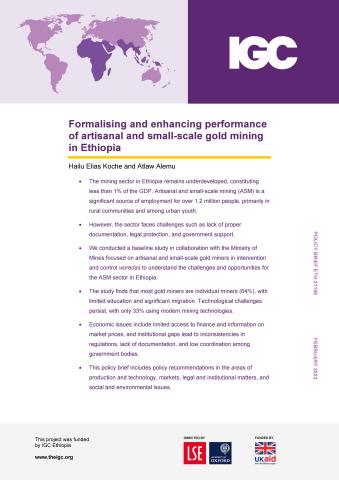Formalising and enhancing performance of artisanal and small-scale gold mining in Ethiopia
The mining sector in Ethiopia remains underdeveloped, constituting less than 1% of the GDP. Artisanal and small-scale mining (ASM) is a significant source of employment for over 1.2 million people, primarily in rural communities and among urban youth. This study seeks to understand challenges and opportunities for the ASM sector in Ethiopia.
-
Koche and Alemu Policy brief February 2023
PDF document • 398.84 KB
- The mining sector in Ethiopia remains underdeveloped, constituting less than 1% of the GDP. Artisanal and small-scale mining (ASM) is a significant source of employment for over 1.2 million people, primarily in rural communities and among urban youth.
- However, the sector faces challenges such as lack of proper documentation, legal protection, and government support.
- We conducted a baseline study in collaboration with the Ministry of Mines focused on artisanal and small-scale gold miners in intervention and control woredas to understand the challenges and opportunities for the ASM sector in Ethiopia.
- The study finds that most gold miners are individual miners (64%), with limited education and significant migration. Technological challenges persist, with only 33% using modern mining technologies.
- Economic issues include limited access to finance and information on market prices, and institutional gaps lead to inconsistencies in regulations, lack of documentation, and low coordination among government bodies.
- This policy brief includes policy recommendations in the areas of production and technology, markets, legal and institutional matters, and social and environmental issues.


